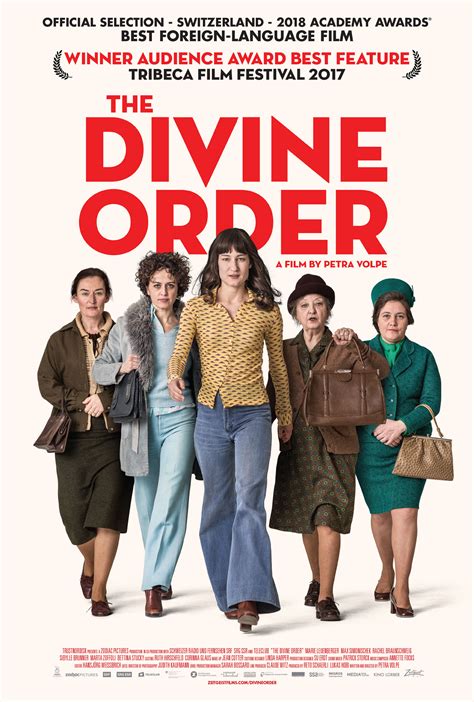The Divine Order

Description:
In 1971, a young housewife living in a small Swiss village becomes involved in the women's suffrage movement. As she starts to question her own beliefs and the role of women in society, she inspires others to join the fight for equal rights.Keywords:
Feminism, Suffrage, Patriarchy, Empowerment, SwitzerlandWhat is the divine order about?
"The Divine Order" is a Swiss drama film set in 1971 that follows the story of Nora, a housewife in a small village who becomes an unexpected advocate for women's rights. As she learns about the upcoming vote for women's suffrage in Switzerland, Nora challenges societal norms and seeks to empower herself and other women in her community. The film explores themes of gender inequality, activism, and personal awakening, highlighting the struggles and triumphs of women fighting for their rights in a patriarchal society.
What is the divine order in the Bible?
In the Bible, the "divine order" often refers to the established hierarchy and roles within creation, as ordained by God. This can include the relationship between God and humanity, as well as the roles of men and women, family structures, and governance. Key biblical passages, such as Genesis 1-3, outline creation and relationships, while Ephesians 5:22-33 discusses marital roles. The divine order emphasizes order, purpose, and harmony in God's creation, reflecting His will and intention for human relationships and society.
What is the law of the divine order?
In the context of the movie "The Divine Order," the term "divine order" refers to the societal norms and laws that dictate the roles and status of women, particularly in Switzerland during the 1970s. The film highlights the struggle for women's suffrage and the fight against patriarchal structures that restrict women's rights and freedoms. The "divine order" symbolizes the traditional expectations and limitations placed on women, which the protagonist and her peers work to challenge and change, advocating for equality and autonomy.
What does it mean to be in a divine order?
In the context of the movie "The Divine Order," being in a divine order refers to a societal structure where traditional roles and norms dictate how individuals, particularly women, should behave and be treated. The film explores themes of gender equality and women's rights, highlighting the struggle against these restrictive norms. The "divine order" symbolizes the accepted social order that upholds patriarchal values, and the characters' fight for change represents a quest for empowerment and the redefinition of their roles in society.
Explore More Categories:
Visual Poetry Friendship Hong Kong Cinema Athletes Mutiny Reconciliation Cultural Exchange Haunting Motorsport Inclusion Satellite Police Brutality Historical Events Fashion Hollywood Reincarnation Unemployment Soccer Black Comedy Los Angeles Origin Multiculturalism Corporate Conspiracy Mutants Neon